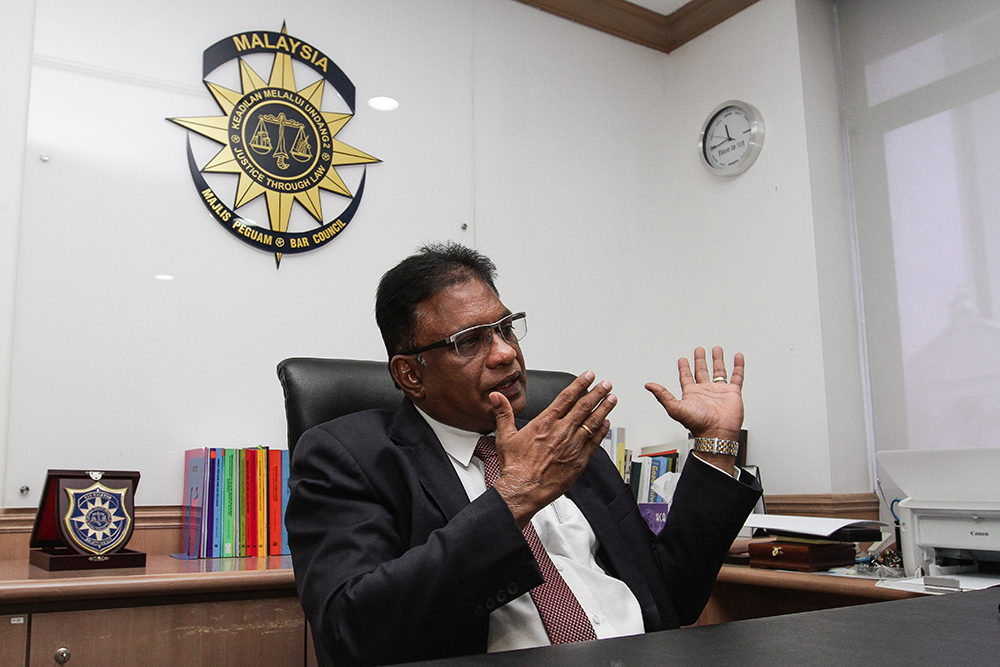KUALA LUMPUR, Aug 25 — The Malaysian Bar called for lawyers to be appointed directly as Federal Court judges as 10 out of 13 judges from the apex court, including all office bearers, are due to retire by next year.
Chief Justice Tan Sri Richard Malanjum and Chief Judge of Malaya Tan Sri Zaharah Ibrahim will hit the retirement age of 66 on October 13 and November 17 this year respectively, while Chief Judge of Sabah and Sarawak Datuk David Wong Dak Wah and Court of Appeal president Tan Sri Ahmad Maarop will turn 66 on August 20 2019 and May 25 2019 respectively.
Judges are only allowed to extend their service by six months after hitting the mandatory retirement age.
“Don’t just look at the Court of Appeal; look at senior lawyers,” Malaysian Bar president George Varughese told Malay Mail in an interview, when asked who should replace the retiring Federal Court judges.
“I want to see a 50-50 mix — 50 per cent from the Court of Appeal and 50 per cent from the Bar.”
Aside from the four office bearers, another six judges on the apex court’s 15-member bench, which currently has two vacancies, are due to retire when they turn 66 or six months past then.
Three of them — Tan Sri Hasan Lah, Tan Sri Zainun Ali, and Tan Sri Aziah Ali — are already serving their six-month extensions as they turned 66 earlier this year.
According to the JAC, there were seven vacancies in the 32-member Court of Appeal bench and 15 vacancies in the 73-member High Court bench as of July 17.
The looming retirements of most of the Federal Court bench within a year from now will lead to even more vacancies in the Court of Appeal and High Court if the government follows the traditional practice of moving judges up the ranks, instead of appointing practising lawyers directly to the superior courts.
There have only been two occasions in history when a lawyer was directly appointed into the bench at the Federal Court and Court of Appeal: Tun Zaki Azmi in 2007 and Datuk Seri Gopal Sri Ram in 1994 respectively. Zaki went on to be Chief Justice in 2008 and retired in 2011.
Traditionally, appointments of superior court judges, which are recommended by the Judicial Appointments Commission (JAC) for the prime minister’s consideration, come from the Judicial and Legal Services, such as legal officers like deputy public prosecutors (DPPs) and senior legal advisers, as well as judicial officers like Sessions Court judges.
They would typically be appointed as High Court justices and work their way up to the apex court.
George said private practitioners used to get appointed as High Court judges, but “not a lot”. They would normally be made judicial commissioners first before becoming High Court judges.
“During Tun Zaki’s tenure, far more practitioners were appointed to the judiciary. Many appointments during his tenure became Court of Appeal and Federal Court judges,” said George.
“Somehow, after Tun Zaki left, the number of appointments from the Bar has reduced.”

Let lawyers be magistrates, Sessions Court judges
George advocated for at least half of the judiciary to comprise members of the Bar at all levels and said the subordinate courts should also be opened to practising lawyers; magistrates and Sessions Court judges all currently come from the Judicial and Legal Services.
According to the Malaysian Bar president, fresh law graduates currently can be appointed as magistrates, who deal with minor crimes like traffic offences and theft.
A magistrate or a DPP with just two or three years’ experience currently can also be made a Sessions Court judge, who has the power to impose a maximum prison sentence of 25 years for drug offences.
George called for clearer guidelines and policy on the criteria for appointing magistrates and Sessions Court judges.
“A magistrate should have minimum three years’ experience either in the Bar or the Judicial and Legal Services. Sessions Court judge appointees should have minimum five to seven years’ experience,” he said.
He recommended that law graduates be made junior DPPs first or sent to the drafting division to draft legislation for Parliament before they are appointed as magistrates.
“It’s like doctors who are house officers in different departments before they become medical officers. Why can’t lawyers go through systematic training?”
More specialists in the Bar
George said there were far more talents in the Malaysian Bar than the Attorney-General’s Chambers who could be appointed as judges, pointing out that the peninsular legal association had 18,000 members.
“Members of the Bar specialise in different areas — criminal, intellectual property, commercial and corporate. People like us will be very useful to get on the bench to deal with those cases, rather than general experience,” said the lawyer.
He pointed out that almost all judges in England came from practice, while Singapore and India also frequently filled their judiciary with members of the Bar.
Singapore’s Chief Justice Sundaresh Menon, George noted, came from practice before he was appointed to various positions in the judiciary, Attorney-General, and then Chief Justice.
When asked if some judges may perceive the appointments of practising lawyers as “parachute candidates”, George said they should not view it as such.
“It cannot be a case where the judiciary is solely the domain of the Judicial and Legal Services.”



















